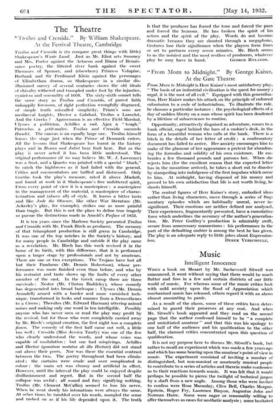The Theatre
"Troi]us and Cressida." By William Shakespeare. At the Festival Theatre, Cambridge
Troilus and Cressida is (to compare great things with little) Shakespeare's Waste Land. Just as Mr. Eliot sets Sweeney and Mrs. Porter against_ the Actaeon and Diana of Renais- sance poetry, the littered river bank against the sweet Themmes of Spenser, and (elsewhere) Princess Volupine, Burbank and Sir Ferdinand Klein against the personages of Elizabethan drama, so Shakespeare in a similar dis- illusioned survey of several centuries shows the old, ideals of chivalry withered and trampled under foot by the injustice, cynicism and sensuality of 1600. The sixty-sixth,sonnet tells the same story as Troilus and Cressida, of purest faith unhappily forsworn; of right perfection wrongfully disgraced, of simple truth miscalled simplicity. Priam's sons are mediaeval knights, Hector a Galahad, Troilus a Lancelot. And the Greeks ? Agamemnon is an effective Field-Marshal, Ulysses a politician, Achilles a cad, Ajax a "tough," Patroclus a petit-maitrc. Troilus and Cressida succeeds Hum/e/. The canvas is an equally large one. Troilus himself leaves the stage just when the Prince of Denmark enters. All the lessons that Shakespeare has learnt in the history plays and in Romeo and Juliet bear fruit here. But as the play is never acted it has been little understood. The original performance (if we may. believe Mr. W. J. Lawrence) was a frost, and a Quarto was printed with a special "blurb," to catch the highbrows as it had failed with the general. Critics and commentators arc baffled and distressed. Only Goethe- took the play's measure, rated it above Macbeth, and found at work in it Shakespeare's free unfettered spirit. From every point of view it is a masterpiece : a masterpiece in the management of the material, a masterpiece of charac- terization and (above all) of style. It leaves a bitter taste and like Jude the Obscure, like other War literature (Mr. Aekeiley's Play, for example), strikes one as more painful than tragic. But this is not the place to define true tragedy or pursue the distinctions made in Arnold's Preface of 1853.
It is ten years since the Marlowe Society presented Troilus and Cressida with Mr. Frank Birch as producer. The memory of that triumphant production is still green in Cambridge. It was one of the top notches in the Society's history, and for many people in Cambridge and outside it the play came as a revelation. Mr. Birch has this week revived it in the home of its birth, with this difference, that it is performed upon a larger stage by professionals and not by amateurs. There are one or two exceptions. The Trojans have lost all but their Pandarus (Mr. Dennis Robertson), whose per- formance was more finished even than before, and who by his restraint and taste shows. up the faults of every other member of the cast. In the Greek camp there are three survivals : Nestor (Mr. Clinton Baddeley), whose comedy has degenerated into broad burlesque ; Ulysses (Mr. Dennis Arundel!) armed with a harder and more varnished tech- nique, transformed in looks and manner front a Demosthenes to a Cicero ; Thersites (Mr. Edward Hannan) uttering animal noises and making only one word in ten intelligible. Possibly anyone who has never seen or read the play may profit by the revival, but for those who were completely carried away by Mr. Birch's original creation, the first night was a complete fiasco. The comedy of the first half came out well, a little too well ; Cressida (Miss Jessica Tandy) was one of the few who clearly understood the words, and whose voice was capable of modulation ; but one had misgivings. Achilles and Hector (quantum mulatus ab jib Hectore) did not stand out above their peers. Nor was there the essential contrast between the two. The poetry throughout had been elimin- ated; the curtains were crude and over complicated in colour ; the main set was clumsy and artificial in effect. However, until the interval the play could,be.enjoyed despite disillusionment and regret. But in the second half the collapse was awful ; all sound and fury signifying nothing. Troilus (Mr. clement McCallin) seemed - to lose. his nerve. When he went slowly his intonations were always. the same. At other times lie tumbled over his words, mangled -the sense and rushed on as if his life depended upon it: The truth
Is that the producer has forced the tone and forced the pace and forced the humour. He has broken the spirit of his actors and the spirit of the play. Words do not become dramatic because they are shouted through a megaphone. Gestures lose their significance when the players form fours or set to partners every seven minutes. Mr. Birch seems to its the noisiest and the most restless of producers, whatever




































 Previous page
Previous page